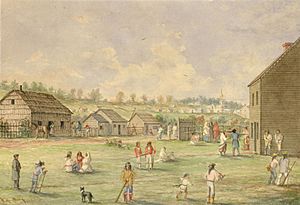Jean-Baptiste Assiginack facts for kids
Quick facts for kids
Jean-Baptiste Assiginack
|
|
|---|---|
| Born | 1768 |
| Died | November 3, 1866 Manitowaning, Canada West
|
| Employer | British Indian Department |
| Spouse(s) | Theresa Catherine Kebeshkamokwe |
| Children | Francis Assikinack |
| Relatives | Andrew Jackson Blackbird |
Jean-Baptiste Assiginack (born 1768, died November 3, 1866) was an important Odawa leader. He lived in the early 1800s. People also called him "Blackbird." This was a direct translation of his name from the Anishinaabe language.
Early Life and War of 1812
Assiginack likely grew up near what is now Harbor Springs, Michigan. When he was young, he studied at a school in Oka, Lower Canada. This school was run by Sulpician priests. There, he became a Catholic.
He probably fought alongside the British during the War of 1812. He took part in battles at Michilimackinac and Prairie du Chien. In July 1813, Assiginack and Captain Matthew Elliott led a group of Odawa warriors. They joined British soldiers in the Niagara peninsula. They fought together in the Battle of Beaver Dams. Assiginack might have received medals for his bravery in the war.
After the war, in 1815, he started working for the British government. He became an interpreter on Drummond Island.
Life After the War
In 1815, the Indian Department on Drummond Island hired Assiginack. He worked there as an interpreter. He met Captain Thomas Gummersall Anderson, and they became good friends. Assiginack could speak several Indigenous languages. This skill was very helpful for the Indian Department. It helped them work with different groups in the Great Lakes area.
Around 1827, he went back to Harbor Springs. He worked there as a Catholic missionary. He hoped a priest would join him, but he ended up teaching the local Ojibwe people about Catholicism by himself.
In 1828, Drummond Island became part of the United States. After this, Assiginack led many Ojibwe people to move to Penetanguishene. In 1832, he moved again to Coldwater, Ontario. He kept sharing his Catholic faith. In Coldwater, he convinced a well-known Chippewa leader, John Aisance, to become Catholic. Aisance had been a Methodist before this.
Moving to Manitoulin Island
In 1836, Assiginack helped create a new community on Manitoulin Island. This community was for different Indigenous groups. Assiginack remained an important leader among the many people who moved there. He was especially important to the Ojibwe who settled near Manitowaning.
Over the next few years, Assiginack stayed loyal to the old alliance with the British. He generally supported the treaties the British made. In 1862, he was the main speaker for a British treaty. However, one of his sons, Edowishkosh, spoke against it. His son was a leader of the group based in Wikwemikong.


